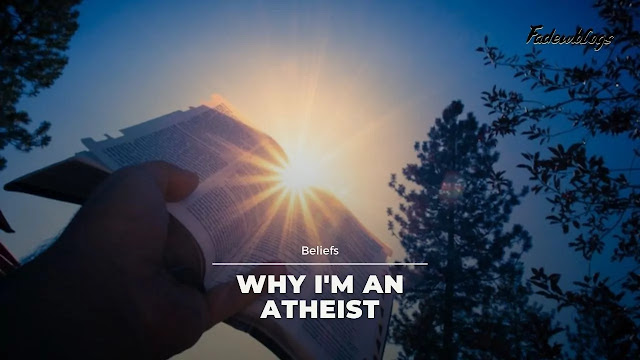Why I'm An Atheist
I am an Atheist because just as our immune system attacks a foreign substance, my very essence had to purge itself of incorrect beliefs. I was brought up as a Lutheran and was a devout believer in my youth. By the time I reached high school, I was teaching Sunday school to second-graders.
Memories of Christmas Eve services are still vivid in my mind. I felt the vibration of the organ music and singing physically at my core. Those sounds, along with the beautiful visuals of candles and bright lights combined with the stained-glass windows, were truly awe-inspiring.
I mention this to demonstrate how much I had to overcome to get on the path of correct thinking. My apostasy started in my first semester of college with an introduction to philosophy class where my professor would interject thought-provoking questions that contradicted notions of my Christianity—let the thinking begin!
Surprisingly, I found myself agreeing with these logical points, and, as the dominoes began to fall, one doubting question led to another. As we studied Descartes, I decided to adopt his method of rejecting all beliefs until I could get to a core truth to build from (cogito ergo Atheism).
My cognitive dissonance, however, was still compelling me to make a deal with myself: it was okay to reject certain notions of Christianity, like miracles and the absolute truth of the Bible, if I still accepted Jesus as my savior, so I convinced myself that I did.
But when that approach still felt like a pebble in my sneaker, I finally asked myself the most common philosophical question of all: Why?
I had no answer. I couldn’t think of any good reason to maintain any aspect of any belief in Christianity. The feeling of both winning and losing something in the same instant was quite odd.
At that point, I still did not identify as an Atheist, per se. I had a growing interest in deconstructing various religions and enjoyed attending informal philosophical discussions hosted by the biblical scholar Dr. Robert Price. During that time, I was also planning my wedding.
Despite the fact that my fiancée (now my wife of 15+ years) was brought up Catholic, neither of us wanted a wedding with any religious element. We asked Dr. Price to officiate and, thankfully, he agreed. Subsequently, he guided me to many good books, starting with Gospel Fictions by Randel Helms. I’ve been reading books like this ever since.
These include works by god-believing philosophers like Benedict de Spinoza and Thomas Paine. Like many other Atheists, I have used my religious education as strong support for my nonbelief. My official claim to being an Atheist started about a year ago.
I first considered the term “agnostic” but that felt like a semantic copout. Through the “law of the excluded middle,” a person either has the belief in a god, or they are in the group consisting of those who negate belief.
It’s easy to see why someone would not understand the need to associate with the negation of a belief.
After all, no one identifies themselves with being a “non-astrologer” or “non-psychic,” but if the movement of astrologers or psychics became influential enough to corrupt education or government, we would see an emergence of people claiming these “non” titles (even though one might argue that “psychics” can do harm).
There are, however, present-day theists who regularly cause harm. That’s why American Atheists file lawsuits dealing with explicit, intentional violations of the First Amendment.
There are continual attempts, often successful, to corrupt education with the unscientific, religious ideas of creationism. Children are threatened with the infinite torture of hell if they do not believe. People have died unnecessarily because stem cell research is hindered by religious objections.
Homosexuals have been killed and have committed suicide as the result of bigoted religious views. Many poor people forego day-to-day essentials because they are pressured with guilt into tithing money they don’t have.
They do this under the false belief that they will eventually be rewarded with more. After all, what could be better than an omnipotent investment portfolio manager?
I am a vocal Atheist because I cannot passively allow such theistic harm to continue. I aspire to actively engage theists via commonsense dialogue to show them that their religion does cause measurable harm. It is at the risk of becoming the persona non grata, but sometimes we need to be the Socratic gadfly to get people to examine their beliefs.
━━━━━━━━━━━━━━━━━━━━━━━━━━━━━━━━━━━━━━━━━━━━━━━━━━━
By Ernest Som
A former Marine who lives in New Jersey with his wife and two kids. He enjoys traveling and all sorts of outdoor activities.
Related:


